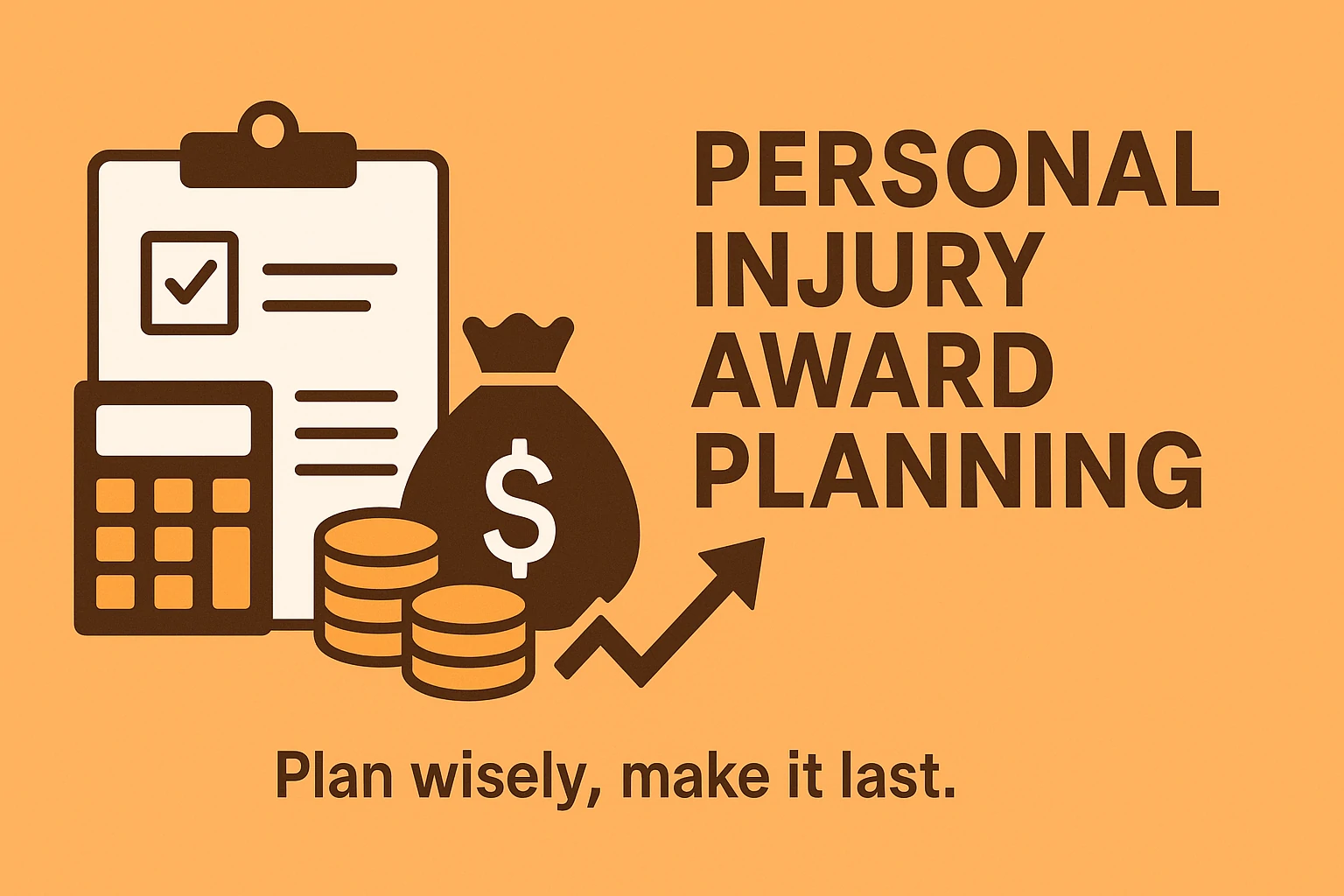Winning a personal injury case brings relief. It closes a painful chapter. The award helps you pay bills, cover losses, and start again. But once the case ends, another test begins. You must protect the money and plan for what comes next.
Many people rush into spending. They make choices without thinking. Some trust the wrong hands. Others lose their benefits or face tax trouble. A few fall into debt again. These mistakes can undo everything the case gave you.
Your injury award should build a better life. It should bring peace, not stress. But that only happens with smart planning. Without a plan, your money will not last. The court gives justice, but your future depends on what you do now.
This guide will walk you through simple steps. It will help you avoid risks and make good decisions. You will learn how to save, spend, and grow your money with care. You do not need expert skills. You just need clear advice and steady focus.
Know What Kind of Award You Got
Personal injury awards come in more than one form. Some give a single large payment. Others offer smaller payments over time. You must know which type you received. That helps you plan the right way.
A lump sum gives full access to the money. It feels like freedom. But it also brings risk. Many people spend too fast. Some forget to set limits. Once the money runs out, there is nothing left. A structured settlement works differently. It gives fixed payments over time. That brings steady support. But it makes large purchases harder.
Your award may cover many things. One part may replace lost wages. Another may pay for pain, suffering, or future care. Each part may follow different tax rules. Your lawyer should explain it all in clear terms.
Knowing these details puts you in control. It helps you avoid mistakes. It also gives you the power to plan each step with care. This is where smart money choices begin.
Clear Your Critical Debts First
One smart step is to use part of your award to clear urgent debt. This may include medical bills, missed rent, or loans with high interest. These debts add pressure and grow worse if left unpaid. Paying them off early gives you peace.
Start with what affects your daily life. If you owe on your home or car, take care of that first. You do not have to pay every bill at once. A lawyer or planner may help you lower the amount or reach a deal.
Do not use your full award to clear all debt. Some lenders may push you once they know you have money. Take your time. Ask questions. Make careful choices. Handle the most serious debts first. Then move to the next.
Removing these debts gives you a fresh start. It frees your mind and lowers stress. You cannot build a strong future until you lift the weight of old bills.
Build a Strong Emergency Fund
Life can change without warning. New problems may come after your case ends. Medical bills may return. Family issues may grow. You need a safety net to face these moments with strength.
Set aside money for at least three to six months of living costs. Cover rent, food, transport, and other basic needs. Put this money in a savings account. Make sure it stays safe and easy to use. Do not invest it. Do not lend it to anyone.
This fund protects you when things go wrong. It helps you avoid panic. You won’t need to borrow or sell things in a rush. One small step now can protect your full plan later.
An emergency fund keeps your future steady. It shows that you are thinking ahead. It gives you calm when life feels out of control.
Get Advice from a Financial Expert
Many people feel lost after a settlement. That is normal. You do not have to do everything alone. A financial advisor can guide you. They bring skill, tools, and a clear plan. Their help can prevent big mistakes.
Choose a fee-only advisor. This means they earn money only from you—not from selling products. They focus on your needs, not commissions. Their advice stays honest and simple.
Ask your lawyer to recommend someone who knows injury cases. You can also search trusted websites or check your state’s advisor list. Pick someone who explains things clearly and does not pressure you.
A good advisor brings peace of mind. They build a plan that fits your life, not someone else’s idea. The fee may seem high, but their help can protect your money far into the future.
Create a Budget That Fits Your Life
A budget gives your money a purpose. It tells you what you can spend, save, and use for future needs. Without a budget, your award may disappear faster than you expect.
Start with your fixed costs. These are rent, bills, food, and transport. Then list flexible costs like clothes, entertainment, and hobbies. Add up both. Compare the total with your monthly income or structured payments. Adjust where needed.
Set limits for each category and follow them. Keep some space for fun and family. A strict budget does not mean you live poorly. It means you stay in control and avoid regret.
Update your budget every month. Life changes. Your costs may rise or fall. A good budget grows with you and helps you stay on track without stress.
Learn more about the South Carolina Statute of Limitations for Personal Injury if your case is still open.
Save for Health and Long-Term Care
Injuries can affect your health in many ways. You may need therapy, tools, medication, or home care. These costs do not stop when your case ends. You must plan for them.
Set money aside for future medical needs. Ask your doctor to estimate your long-term care. If needed, open a separate health account. Some people use trusts or insurance to help manage these costs.
Speak to a benefits expert if you receive Social Security, Medicaid, or disability. Your settlement may affect those benefits. A plan can help you stay qualified while still using your award wisely.
Your health is the reason you got the award. Take care of it first. Do not let medical bills sneak up and destroy your peace.
Understand the Tax Rules
Many people think injury settlements are tax-free. That’s not always true. Money for physical harm often avoids taxes. But awards for lost wages, emotional distress, or interest may be taxed.
Do not guess. Talk to a tax advisor. Ask them to review your award and explain what needs to be reported. They can also help you prepare the right forms and avoid penalties.
Failing to plan for taxes can lead to surprise bills. It can damage your credit or bring legal trouble. A little tax planning now saves a lot of pain later.
Think About Your Future Goals
An injury can change your direction, but it does not end your future. You still have goals. Your award gives you a way to reach them, one step at a time.
Think about what matters most. Do you want to return to school? Own a home? Build a small business? Help your children? Travel to new places? Each goal needs care and planning. Set small steps. Use part of your award to move closer to each one.
Do not let the injury hold you back. Let your choices guide your next chapter. When your goals are clear, your money will have a purpose. Each dollar will help you move forward.
Protect Your Award from Loss
Money attracts attention. Some people may try to take advantage of you. Others may pressure you to give or invest in risky deals. You must protect your award.
Avoid fast offers, high-risk investments, and people who promise big returns. Use legal tools like trusts to guard your money. If needed, appoint someone you trust to help manage it with you.
Divorce, lawsuits, or scams can take your money if it’s not protected. A lawyer can help set up the right tools to keep your settlement safe from threats.
Stay alert and stay in control. You worked hard for this award. Do not let others take it away from you.
Review Your Plan Every Year
Your needs will change over time. Your budget, goals, or health may shift. That’s normal. Review your plan once a year. Check what works. Fix what doesn’t.
Talk to your advisor again. Adjust your savings or spending. Update your legal documents. Revisit your goals.
Regular reviews help you catch problems early. They also remind you how far you’ve come. A little effort each year keeps your plan strong and focused.
See the Litigators for Justice Car Accident Personal Injury Attorneys TV Commercial to understand how legal ads share real case insights.
Conclusion
A personal injury award means more than cash. It gives you a new start. It offers comfort, safety, and control, if you use it the right way.
Good planning keeps your future safe. Pay urgent bills. Set aside money for care. Make a budget. Ask for expert advice. Your award can last many years, or it can fade fast. What happens next depends on you.
Each smart step leads to a better life. This money should lift you, not weigh you down. Use it to stay strong, build new goals, and move forward with purpose.
You did not choose the injury. But now you can choose what comes next. Turn the pain into progress. Use your award to build something that lasts.




